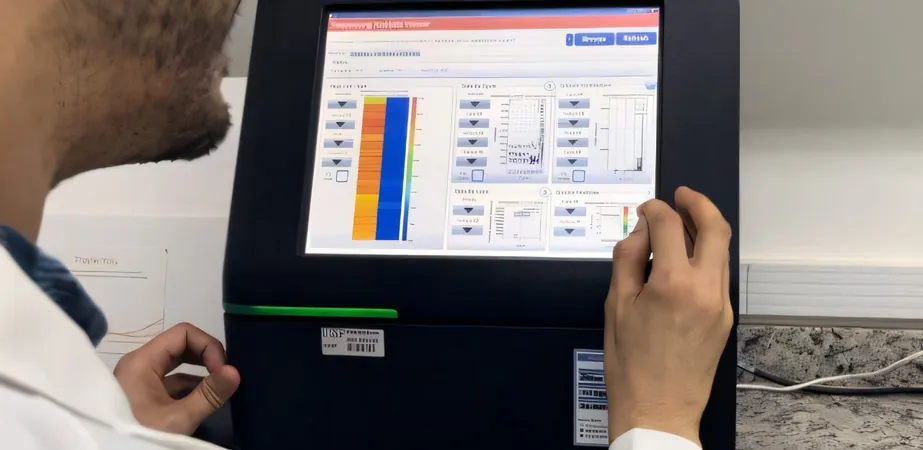
Revolutionary AI Tool to Decode Cancer's Aggressiveness: A Game Changer in Treatment!
2025-07-15
Author: John Tan
A Breakthrough in Cancer Research
As global cancer rates soar, the disease's complexities continue to challenge researchers striving for advancements in diagnosis and treatment. Enter artificial intelligence (AI), emerging as a powerful ally in the fight against cancer.
Introducing a Groundbreaking AI Tool
A pioneering tool developed by a team of Brazilian and Polish scientists could transform how we understand cancer aggressiveness. Featured in 'Cell Genomics,' this innovative machine-learning model assesses tumor aggressiveness by analyzing specific protein markers.
Understanding the Stemness Index
The AI generates a 'stemness index' ranging from zero (low aggressiveness) to one (high aggressiveness). A higher stemness score indicates that a tumor is more resilient to treatments and has a higher chance of recurrence. Essentially, this index provides a glimpse into how closely cancer cells mimic pluripotent stem cells, known for their ability to morph into various cell types.
Creating a Powerful Diagnostic Tool
Using extensive data from the Clinical Proteomic Tumor Analysis Consortium (CPTAC), researchers analyzed over 1,300 cancer samples across various types including breast, ovarian, lung, kidney, and pancreatic cancers, developing what they call the Protein Expression-Based Stemness Index (PROTsi). By combining PROTsi with proteomic data from 207 pluripotent stem cells, they pinpointed aggressive tumor-driving proteins that could become vital targets for future therapies.
An Overdue Revolution in Cancer Treatment
Professor Tathiane Malta of the Ribeirão Preto Medical School in Brazil emphasized the potential of many identified proteins, stating that many are already targets for existing cancer drugs. "Our work links the stemness phenotype to tumor aggressiveness, offering promising directions for future studies and personalized treatments."
Rising Cancer Rates Demand Urgent Action
On World Cancer Day, the World Health Organization highlighted alarming statistics: a cancer diagnosis occurs globally every minute. Cancer emerges as a leading cause of death, particularly affecting younger populations. A recent 2023 study showed a staggering 79% rise in early-onset cancers among adults under 50 from 1990 to 2019, alongside a 28% increase in related deaths.
The Importance of PROTsi in Cancer Research
According to the National Cancer Institute in Brazil, an estimated 704,000 new cancer cases are anticipated between 2023 and 2025, with non-melanoma skin cancer and breast cancer among the most common. During its trial phase, PROTsi consistently distinguished between stem and differentiated cells, proving particularly effective for diagnosing higher-grade tumors.
A Bright Future for Cancer Patients
The researchers are committed to refining their model for broader applicability across various cancer types. "Our aim is to provide a robust data source that will contribute to future cancer research, ultimately improving patient care and outcomes," Professor Malta declared.
In Summary: A New Dawn in Cancer Treatment
As science progresses, the quest against cancer takes a hopeful turn with the introduction of cutting-edge AI tools like PROTsi. By harnessing technology to unveil the mysteries of tumor behavior, researchers are paving the way for groundbreaking therapies that could one day save countless lives.

 Brasil (PT)
Brasil (PT)
 Canada (EN)
Canada (EN)
 Chile (ES)
Chile (ES)
 Česko (CS)
Česko (CS)
 대한민국 (KO)
대한민국 (KO)
 España (ES)
España (ES)
 France (FR)
France (FR)
 Hong Kong (EN)
Hong Kong (EN)
 Italia (IT)
Italia (IT)
 日本 (JA)
日本 (JA)
 Magyarország (HU)
Magyarország (HU)
 Norge (NO)
Norge (NO)
 Polska (PL)
Polska (PL)
 Schweiz (DE)
Schweiz (DE)
 Singapore (EN)
Singapore (EN)
 Sverige (SV)
Sverige (SV)
 Suomi (FI)
Suomi (FI)
 Türkiye (TR)
Türkiye (TR)
 الإمارات العربية المتحدة (AR)
الإمارات العربية المتحدة (AR)